Offshore Software Development at Infofin
An overview
The Infofin Approach to Project Management
Infofin is dedicated to creating value through technology. We offer
you a unique approach that combines business and IT consulting to
identify, scope, plan, build and transfer innovative IT solutions. Our
methodology enables customers to leverage current IT investments while
transforming their business into an open and adaptable
e-infrastructure. Clearly, this approach helps us to identify,
validate and plan new initiatives, scope out the best technologies
early in the process, which ensures that the IT solution reaches the
business goals set by the client to derive the maximum benefit out of
the investment. Simultaneously, we start the process of transferring
the skills through every step of the project, empowering the client to
effectively manage the solution.
Global Approach to Project Methodology
We apply the Infofin methodology to our projects. This strengthens our
knowledge and competencies, while guaranteeing the quality and consistency
of our solutions that clients have come to expect from Infofin.
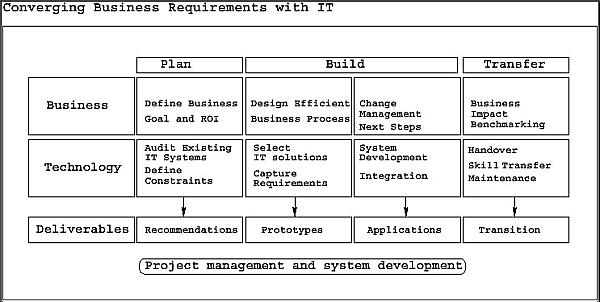
Leveraging the Unified Process for Project Management
The Infofin approach has been combined seamlessly with the Unified Process
to derive major benefits in managing and implementing projects. This approach
provides the client a better, more secure feeling of control of the project,
while serving as a foundation for getting feedback to prevent sidetracking.
Key elements of the process are:
-
Business case development
-
Benchmarking and option analyses
-
Risk-driven project management
-
Iterative analysis, design, development and testing (use case-driven development)
-
Integrated quality assurance gates
-
Benefits management (post-project auditing)
These principles ensure benefits to the client from day one. We carefully
articulate and scope the projects based on the business goals and focus
on deploying solutions successfully. At each iteration, we allow the client
to decide when to move to the next phase of the project. Put simply,
a lengthy requirement specification, often outdated at delivery due to
change requests from the client during the development, is not encountered
by following the Infofin methodology. This effectively enhances the
realized benefits from project launch to post-implementation optimization.
Software Development methodology at Infofin
-
Identifying and appointing key persons Our cooperation with clients
is based on a "communication channel" approach. This means that the client
appoints someone who will be our single communication point for all official
project-related issues and we assign a project manager who will be the
only person for all official interactions between Infofin and the client.
Key people
-
Infofin's On-site Co-ordinator and Project Manager
-
Client's Project Coordinator/Manager
Role of Onsite Coordinator
-
Understand Client's Business and processes
-
Provide effective Communication
-
Update Client on Project Progress
-
Handling deliveries
-
Project Initialization This stage starts by studying the initial
system requirements provided by the client. Jointly, with the client's
IT staff, Infofin's project manager conducts extensive sessions for identifying
requirements and eliminating possible misunderstandings. Future users of
the system are also interviewed. The project manager and the client's IT-staff
define Configuration Management issues, approaches to sharing/delivery
of code, sharing information about defects, managing changes and mapping
them to specifications, etc.
Deliverables
-
Configuration Management Document
-
Project vision and goals
-
Defining requirements and deliverables The objective at this stage
is to identify system requirements and their priorities in order to make
a high-level design, system prototype and to plan stages of development.
If applicable, requirements for user documentation and/or on-line manuals
are identified. Stages of project development with deliverables corresponding
to every stage are defined. We develop the project requirements document,
outlining functionality of the system and non-functional requirements (e.g.
performance). In parallel, we form a project team with identified skills.
Business and technical project knowledge is transferred to the development
and test teams.
Deliverables
-
System requirements
-
User requirements documentation
-
Stage Plan document
-
Project Requirements document
-
Design and planning This stage starts with the high-level system
design, i.e. conceptual architecture of the system. The next step is to
create the Functional Specifications Document describing possible system
configurations, major algorithms, internal and external interfaces, etc.
In case of an interactive system, we build an UI Prototype. The test team
leader is responsible for test planning, i.e. creating a list of test cases.
We develop the structure of user documentation. Detailed planning of development
is finalized at this stage.
Deliverables
-
Project plan - defining deliverables, milestones and responsibilities.
-
High-Level Design Document
-
Functional Specification Document
-
HTML UI prototype
-
Development and test plans
-
Master Test Plan document
-
Confirmation of the project Based on the acceptance of the HTML
prototype, architecture and choice of technology, the development team
under a Project manager will draft a plan for the execution of the project
giving time and cost estimates.
Deliverables
-
Development and Quality Assurance The development stage includes
low-level system design after which routine coding and Quality Assurance
procedures can begin. In parallel, dedicated technical writers develop
user documentation.
-
Ensuring Quality Delivering quality consistently is of utmost importance
to Infofin. Quality control activities, reviews, inspections, and tests
are integral to our development processes. We have employed stringent quality
assurance processes and methodologies based on the recommendations of Rational
Unified Process and CMM Level 3 specifications. In line with the quality
requirements, we practice standard software development methodologies and
practices which involve principles of Function Point Analysis, Design Patterns
and UML.
-
Incremental development Development of the application takes place in progressive
phases or increments. Incremental delivery permits experimentation of complex
solutions and modifications through hands-on exposure to the delivered
component.
At this stage regular contact is maintained with the Client Project manager(CPM).
-
The CPM is kept updated of the project status through a project website
which shows him the latest schedule and status of the project.
-
Regular voice chats are established to update and confirm requirements.
-
A web-based bug tracking system is accessible to the CPM, to enter and
track system deficiencies.
-
A robust version control system like CVS is in place to manage issues arising
out of multiple versions.
Deliverables
-
Deliveries with levels of functionality corresponding to the Stage Plan
Document
-
User Documentation
-
Commissioning Commissioning involves the installation of the final
system on the client's infrastructure, field testing by the client's personnel
and processing feedback from the client's field testers. Deliverable
-
Final system delivery
-
Feedback from the client's field testers
-
On-going maintenance We implement additional features requested
by the client and fix defects found during the warranty in line with the
maintenance contract. Deliverable
Delivering quality software
Infotech Financials (Infofin) undertakes software development at its modern
development centre in India, and has executed a number of projects for
its clients in the United States, India and the Middle East. The core competence
of Infofin lies in delivering quality software solutions at reasonable
costs owing to Infofin fully leveraging the advantages of executing development
of software at its Mumbai facility in India. Our philosophy is to partner
with our customers, bringing dedicated attention to the project in order
to deliver high-value, complete solutions.
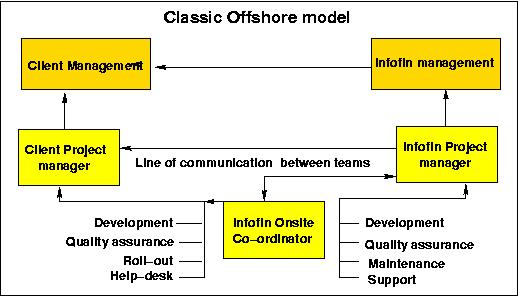
Advantages of offshore development
Some of the advantages of offshore development are listed below:
-
Project costs come down considerably.
-
Fewer time and cost over-runs on project deadlines and budgets.
-
Faster and more flexible deployment of resources.
-
Shorter learning curves, owing to high levels of expertise in technology
and domain.
-
A faster time-to-market for the client.
Offshore Development Centre (ODC)
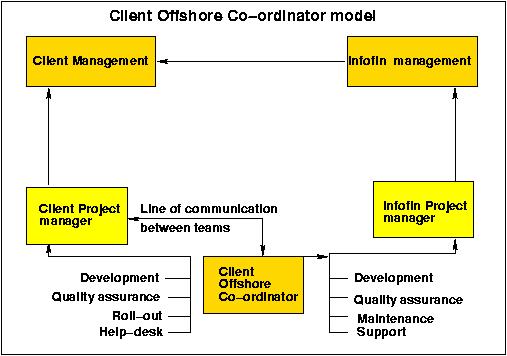
In view of the benefits of off-shore development, Infofin prefers to
set-up dedicated off-shore development centres for clients and their specific
projects. We have state-of-the-art infrastructure, including advanced computing
and communication equipment at our Mumbai development centre and use tested
methodologies to manage and execute projects on time with significant cost
benefits that are associated with offshore development.
Advantages of ODC
-
Clients focus on their core business while outsourcing the non-core activities.
-
Specialised pool of technology and domain resources, dedicated to working
exclusively for the Client.
-
Combination of teams onsite and in India can provide faster deliveries.
-
Faster recruitment, training and deployment of resources.
-
Comprehensive Security Policy to protect infrastructure and client's Intellectual
Property Rights.
Reducing risks in offshore development
-
The scope of work needs to be clearly defined and phased-out for development,
so that projects do not face time and cost over-runs.
-
A good communications infrastructure is crucial, such as good Onsite Coordinator,
connectivity to the Internet, email, etc., between the client's site and
the outsourced location.
Guarantee of the Approach
-
On-time completion of the project.
-
Delivery of a high-quality system meeting the exact business requirements
-
Development of a flexible and easy to use system.
Outsourcing Models
In the new economy, we realize that customers are increasingly demanding
the flexibility that best serves their unique business requirements. We
also provide the option of selecting a combination of business models to
suit various phases of a project cycle.
-
Fixed Time/ Fixed Price Our fixed time, fixed price model offers
customers a low-risk option and can be employed when the scope and specifications
of the project are reasonably clear. This model guarantees on-time, on-budget
delivery of projects. Deliverables, Costs and Time-lines are clearly defined
in the Fixed Time/Fixed Price model. In fixed time, fixed-price engagements,
Infofin follows a phased approach that includes scoping, development, implementation
and business support. Combining the fixed time, fixed price model with
our solutions center, we can offer customers a tremendous advantage on
the cost front.
-
Time and Materials
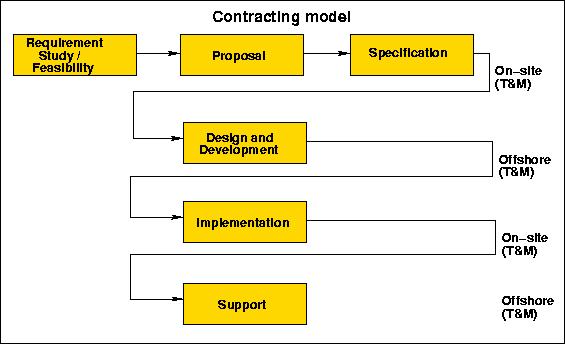
In this business model, Infofin forms project teams with the required
team members, project managers, equipment and infrastructure based on project
requirements. Customers pay a charge per hour based on the size and composition
of the team. This model offers the flexibility to balance team size and
project workloads. Most of our services are delivered using this business
model. Infofin could bid for partial phases of a project on a fixed time,
fixed price basis and the remaining parts on a time and material basis.
-
Revenue/Risk Share We have endeavoured to partner with our Clients,
by offering unique risk-reward models for project delivery. Revenue/Risk
Share models are popular amongst emerging businesses or technology companies,
wherein Infofin can invest and share the development costs in return for
jointly owning the Intellectual Property Rights (IPR) and sharing revenue/licensing
fees. The risk and reward model is typically used during software product/subsystem
development.
Infofin's Collaborative Approach
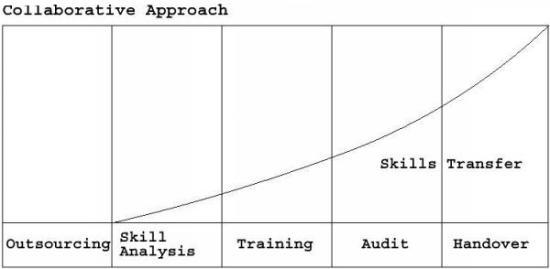
Our approach to IT services involves extensive collaboration between
the client's IT team and the Infofin team. This approach is extended to
analysing and advising on business re-engineering, IT planning and implementation
issues including training the client's IT team to use and maintain new
systems effortlessly.
|